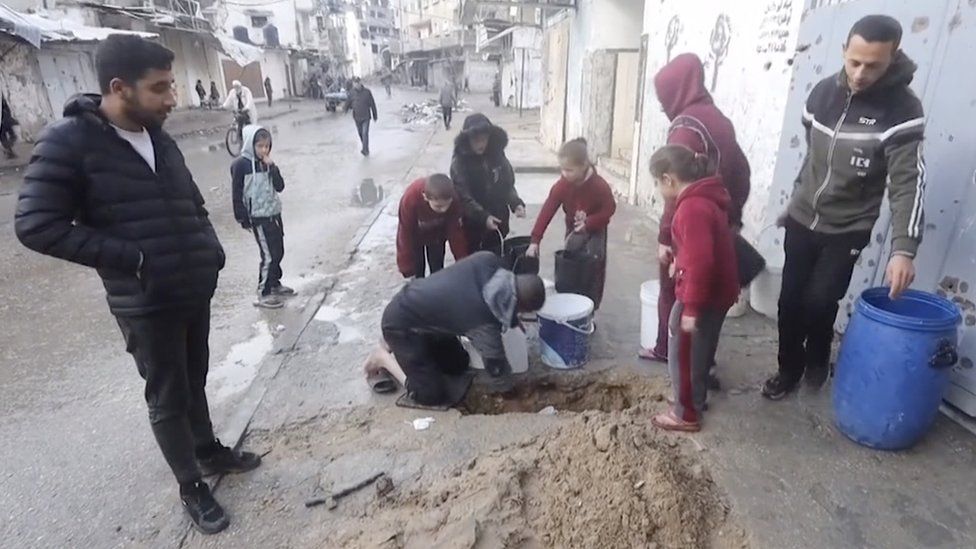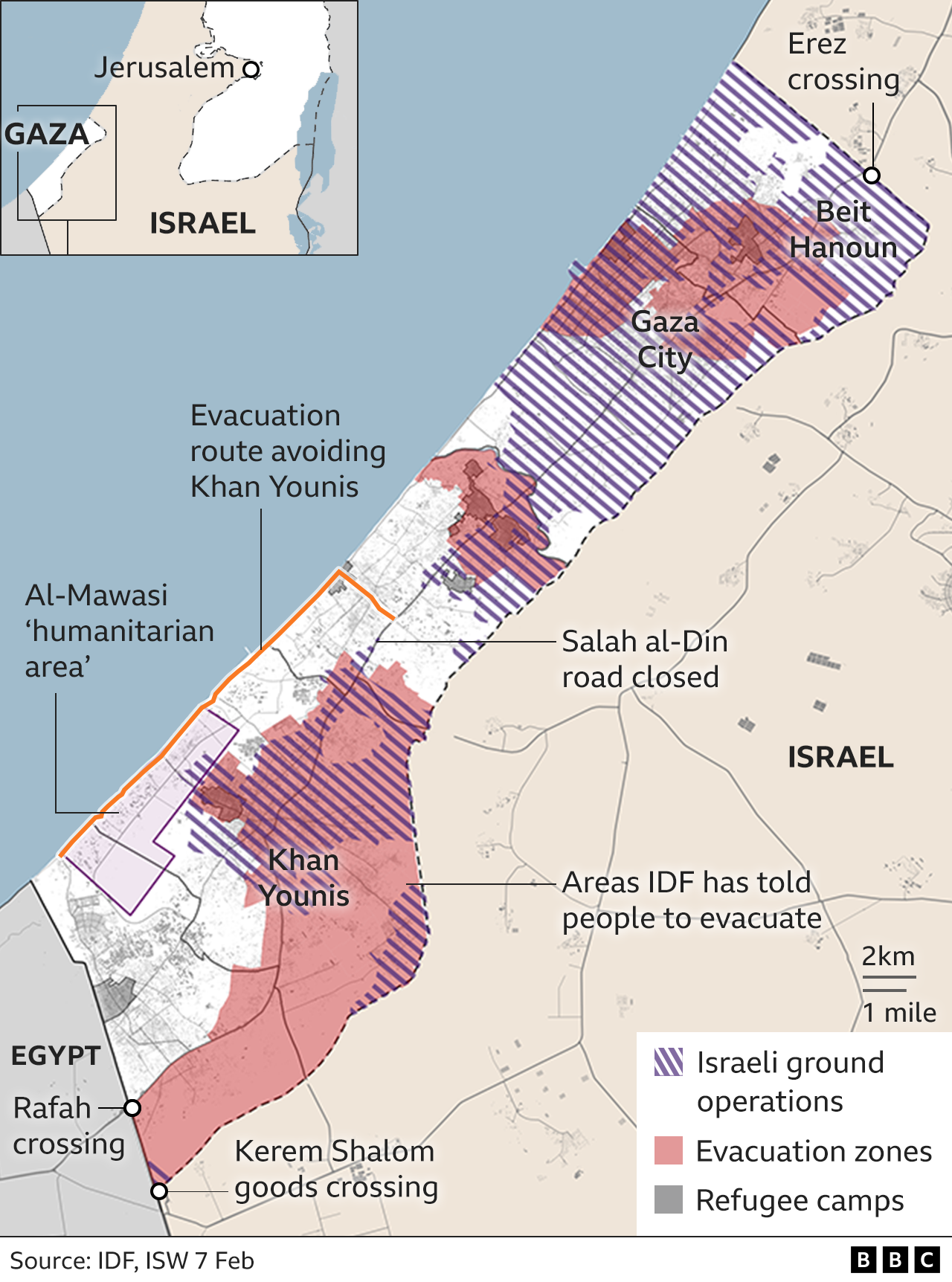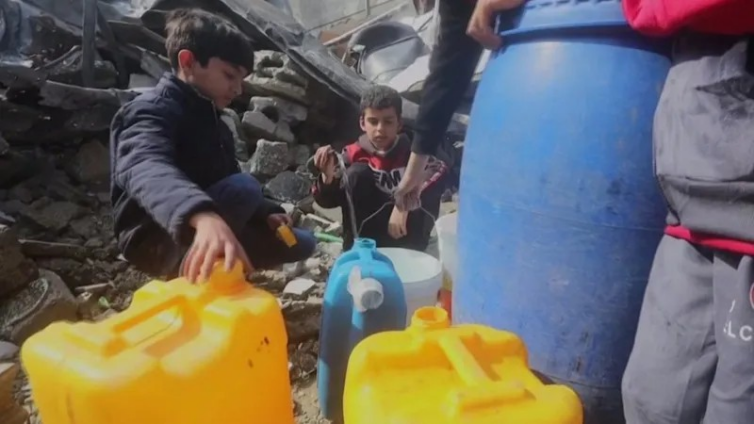People living in the isolated north of Gaza have told the BBC that children are going without food for days, as aid convoys are increasingly denied permits to enter.
Some residents have resorted to grinding animal feed into flour to survive, but even stocks of those grains are now dwindling, they say.
People have also described digging down into the soil to access water pipes, for drinking and washing.
The UN has warned that acute malnutrition among young children in the north has risen sharply, and is now above the critical threshold of 15%.
The UN's humanitarian coordination agency, Ocha, says more than half the aid missions to the north of Gaza were denied access last month, and that there is increasing interference from Israeli forces in how and where aid is delivered.
It says 300,000 people estimated to be living in northern areas are largely cut off from assistance, and face a growing risk of famine
A spokesman for the Israeli military agency tasked with coordinating aid access in Gaza said in a briefing last month that there was "no starvation in Gaza. Period." The agency, Cogat, has repeatedly said it does not limit the amount of humanitarian aid sent to Gaza.
The BBC spoke to three people living in Gaza City and Beit Lahia, and viewed footage and interviews filmed by local journalists in Jabalia.
Mahmoud Shalabi, a local medical aid worker in Beit Lahia, said people had been grinding grains used for animal feed into flour, but that even that was now running out.
"People are not finding it in the market," he said. "It's unavailable nowadays in the north of Gaza, and Gaza City."
He also said stocks of tinned food were disappearing.
"What we had was actually from the six or seven days of truce [in November], and whatever aid was allowed into the north of Gaza has actually been consumed by now. What people are eating right now is basically rice, and only rice."
The World Food Programme (WFP) told the BBC this week that four out of the last five aid convoys into the north had been stopped by Israeli forces, meaning a gap of two weeks between deliveries to Gaza City.
'Serious risk of famine'
"We know there is a very serious risk of famine in Gaza if we don't provide very significant volumes of food assistance on a regular basis," said the WFP regional chief, Matt Hollingworth.
The UN Office for the Coordination of Humanitarian Affairs (Ocha) said there had been a sharp increase in the number of aid missions denied access to northern Gaza: with 56% of deliveries denied access in January, up from 14% in October to December.
It also said the Israeli military "at times required justifications" for quantities of fuel destined for health facilities, and "imposed reductions on the volume of assistance, such as the quantity of food".
The BBC asked Israel's army for a response. They directed us to Cogat, which told us to address our questions to the army.
Duha al-Khalidi, a mother of four in Beit Lahia, told the BBC two weeks ago that she walked six miles (9.5km) to her sister's house in Gaza City, in a desperate search for food, after her children had not eaten for three days.
"I don't have any money, and even if I did, there's nothing in the town's main market," she said. "[My sister] and her family are also suffering. She shared with me the last amount of pasta in her house."
"We feel that death has become inevitable," her sister, Waad, said. "We lost the top floor of our house, but we are still living here despite the fear of collapse. For two weeks, we can't find anything in the market; and if some products are available, they are 10 times their normal price."
A famine risk assessment, carried out by several UN agencies, estimated that almost a third of residents in northern areas could now be facing a "catastrophic" lack of food, though restrictions on accessing the area make real-time measurements very difficult.
Families in northern areas are also struggling to find reliable water supplies.
"Many of us are now drinking unpotable water. There are no pipes; we have to dig for water," explained Mahmoud Salah in Beit Lahia.

Video filmed in the Jabalia neighbourhood north of Gaza City shows residents sitting among the rubble of bombed out streets, digging down into the earth to tap large underground water pipes.
"We get water here once every 15 days," Yusuf al-Ayoti said. "The water is dirty. Our children are inflamed and their teeth are eroded from the dirty water. There is sand in it, and it's very salty."
After four months of war, the makeshift solutions for bridging the hunger gaps are wearing thin. And there are few ways to restock Gaza's larder.
The territory was reliant on food aid before the war; now much of its agricultural industry has been ruined or abandoned.
'The destruction is vast'
New figures from the UN suggest that more than half the agricultural land in the central region of Deir al-Balah has been damaged. This includes an olive press and farmland belonging to Bassem Younis Abu Zayed.
"It looks like the aftermath of an earthquake," he said. "The destruction is vast, covering neighbouring buildings and farm animals. Even if we manage to restore the mill, 80-90% of the olives have gone. It's not just a loss for this year, it's a loss for the next several years."
Further south, in the border town of Rafah, more than a million people displaced by the fighting elsewhere now jostle for space with the town's 300,000 residents.

Israel's army regularly publishes what it says is recent footage of busy markets and restaurants in Gaza's southern centres. A majority of the 114 aid missions to southern areas of Gaza managed to get through last month, but residents and aid agencies say many people are still going hungry, and a public health crisis is looming with a lack of shelter, sanitation and medical care.
Aid can be blocked by fighting, bureaucracy or rubble. Earlier this week, a food convoy waiting to head north in Gaza was hit by naval gunfire.
But deliveries are also complicated by the growing desperation of Gaza's people, says Matt Hollingworth.
"We need the law and order issue resolved, so that we're not having to negotiate our way through crowds of desperately hungry people, to get to other people that we've yet to reach," he said.
"It's probably the level of helplessness that worries me. People have lost hope."
A deal between Israel and Hamas is seen by many as the only way to get more aid into Gaza, and get Israeli hostages out.
As Israel bombs Rafah, ahead of a widely expected ground offensive there, leaders on both sides are under pressure to end the suffering of people trapped in Gaza - their enemy's, and their own.
Latest Stories
-
Elevating Ghana’s creative industry: A blueprint for competing with Nigeria and South Africa
7 mins -
Poor finishing a problem for Asante Kotoko throughout the season – Prosper Ogum
26 mins -
Samini teams up with Francis Osei for ‘Sticks N Locks’ EP
34 mins -
Government should resource record labels – Seven Xavier
53 mins -
I need majority in parliament to successfully complete my term – Akufo-Addo pleads
55 mins -
Next NDC government will not recognise illegal contracts signed by current administration – Sammy Gyamfi
1 hour -
Premier League clubs vote in favour of spending cap plans
1 hour -
Nigeria’s fuel crisis brings businesses to a halt
1 hour -
King Promise impresses fans at sold out show in Singapore
1 hour -
Ejisu by-election to proceed after plaintiff withdraws injunction application
2 hours -
CSOs and NGOs unite to push for priority demands at INC-4
2 hours -
Fuel tanker bursts into flames on Kumasi-Accra highway
2 hours -
EC’s stolen BVR kits, laptops: One granted bail, three still on remand
2 hours -
2 Things: Sista Afia releases first song off her upcoming album
2 hours -
GHS to embark on COVID-19 vaccination campaign starting May 4
2 hours

